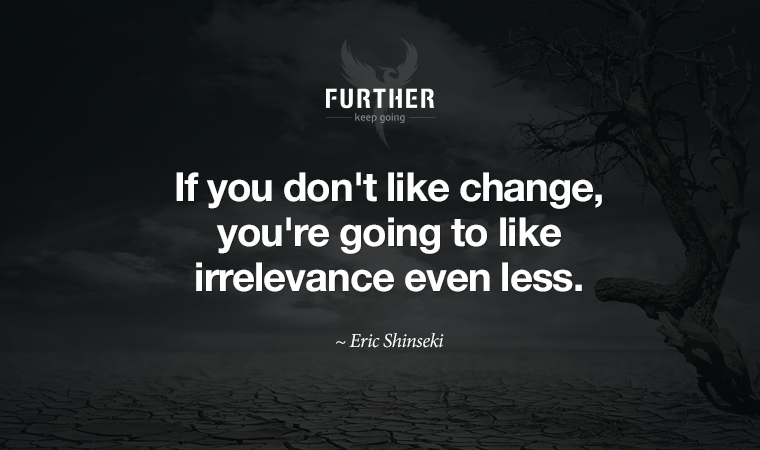
Of the many gradual changes that may suddenly impact your life, artificial intelligence tops the list. For some people, it’s going to be a real problem for their livelihood.
No need to freak out. But it’s smart to get ahead of the topic, given than most people won’t.
AI is all over the news, and has been for the last few years. So I was shocked to run across this factoid in The Future of Work:
When 1,500 senior business leaders in the United States were asked about it in 2017, only 17 percent said they were familiar with the term.
Umm, what? Okay, so you’re a business leader, and you don’t pay attention to business news? Cool, cool, cool.
Maybe ever watched a movie, though? Say, 2001: A Space Odyssey, or The Matrix, or maybe that Steven Spielberg flick called (wait for it) A.I. Artificial Intelligence?
Perhaps the science fiction examples aren’t fair, because that’s pretty far from what we’re facing near term. Plus, AI hasn’t reshaped most businesses at this point, despite huge leaps in the technology.
That’s because it’s hard work to integrate AI into an old-schoool organization. Which means too many companies are putting it off.
You may think that allows you a sigh of relief, but it shouldn’t. Because beyond the massive ambition of artificial intelligence leaders like Google, Amazon, and Facebook, new startups are building from the ground up with AI and other advanced technology.
That means they’re aiming to get that money from 20th century companies doing it the old-fashioned way. The disruption is only just beginning, and plenty of existing companies are going to disappear.
There may not be much you can do about that. But what you can do is prepare yourself by understanding what this big inevitable change means.
You hear that Mr. Anderson? That is the sound of inevitability.
Sorry, couldn’t resist.
What I’m trying to say is this: AI won’t necessarily eliminate your ability to make a living. But it will require you to learn how to make the most of it.
Whether you’re smartly out on your own or hanging tough as an employee, you’ll need to master the ability to enhance your uniquely human abilities with the aid of AI. It doesn’t matter if you’re not a “tech” person — you use powerful digital technology every day, and that will accelerate heavily in the future.
The United States currently leads the world in AI-related patents, with China coming on strong. But another AI powerhouse is the relatively tiny country of Finland.
Along those lines, the University of Helsinki offers a fantastic free course on artificial intelligence. Don’t worry, it’s in English (although learning Finnish on the fly would certainly impress people at parties).
This is valuable stuff, my friends. Take advantage of it:
Keep going-
P.S. A kind Further reader informed me that she likes sharing individual newsletter items, but can’t always find the separate links. I also enjoy when you share stuff from Further (more than I could ever say), so don’t miss my piece on sleep deprivation, Trudi’s article about remote work, and the sad tale of New Order’s Blue Monday.
Here’s why you’re stupid without sleep

By Brian Clark
You know by now that sleep deprivation is a serious problem. Just for starters, you’ve got a heightened risk of depression, obesity, diabetes, heart attack, and stroke.
And you definitely feel worse when you haven’t slept. Your brains doesn’t seem to be firing correctly, and it turns out that’s exactly the case:
UCLA researchers report sleep deprivation prevents neurons from correctly connecting with each other, resulting in temporary cognitive lapses in visual perception and memory.
So when you head off to work without your laptop, or mindlessly miss your turn on the way to drop off the kids, there’s a reason. Your brain is in a defective state of being.
Neurosnoozer
The new study reveals how sleep deprivation is no joke:
“We discovered that starving the body of sleep also robs neurons of the ability to function properly,” said senior author Dr. Itzhak Fried, professor of neurosurgery at the David Geffen School of Medicine at UCLA and Tel Aviv University. “This paves the way for cognitive lapses in how we perceive and react to the world around us.”
When you don’t sleep, your neurons lose some of their ability to encode information and translate visual input into conscious thought. This can have dangerous consequences when encountering the unexpected, such as a pedestrian stepping in front of your car.
“The very act of seeing the pedestrian slows down in the driver’s over-tired brain,” Dr. Fried explained. “It takes longer for his brain to register what he’s perceiving.”
Worse, important areas of your brain are dozing to compensate for the fact that you haven’t. So although your brain is technically up and running, you suffer significant mental lapses.
Go home … you’re drunk
You may have heard before that pulling an all-nighter leaves you in a state similar to alcohol intoxication. The drunk metaphor is also not something to laugh off.
“Inadequate sleep exerts a similar influence on our brain as drinking too much,” said Fried. “Yet no legal or medical standards exist for identifying over-tired drivers on the road the same way we target drunk drivers.”
As if that’s not enough to up your shuteye, you’re certainly not living your best life by being sleep deprived. Getting enough sleep is a key part of being a happy and high-performing person, and provides benefits to your heart, weight, mind, and more.
Blame Tired Brain Cells For Mental Lapses After Poor Sleep (Neuroscience News)
How to beat the catch-22 of remote work

By Trudi Roth
Nowadays, work is not necessarily a place you go so much as it is something you do — hopefully with passion and purpose. The rise of remote work is real, with over 60% of U.S. jobs done at least partially from afar.
So much for the myth that remote work means you’re only remotely working. There’s a mountain of conclusive evidence showing that remote workers are substantially more engaged than office-bound counterparts.
The logic behind this productivity boost is actually quite easy to understand; by giving workers more control over their personal lives and permitting them to schedule their work-life balance accordingly, companies are making them happier and more fulfilled as they enable Average Joes to become workplace superstars.
That means remote workers have more time to enjoy loved ones, pets, and the absence of office politics. But it also takes a little work to make it work.
Work/work balance
The best things about distance work also reveal the downsides. Your dog, no matter how awesome, is not a substitute for human contact. You miss out on impromptu meetings and socializing. And your fluid schedule and always-on devices make it easy to work overtime, all the time.
Balance is in the eye of the beholder, and it’s not your imagination that flying solo can end up too much of a good thing. As Gallup found in their recent State of the American Workplace report:
Engagement climbs when employees spend some time working remotely and some time working in a location with their coworkers. The optimal engagement boost occurs when employees spend 60% to less than 80% of their workweek — or three to four days — working off-site.
Facetime, with all apologies to Apple, is best done at least occasionally in person. Who knew?
What you need to go the distance
While some big companies like Yahoo, Bank of America, and IBM have pulled back on work-from-home options, where you work isn’t the true barrier to innovation and collaboration. It’s how you work that matters.
Most employers don’t have distributed workforce policies in place to adequately train and equip you for flexible work success. That means you’ve got to be smart and disciplined with your schedule, and routinely use collaboration tools to stay in touch.
The point is to stop thinking that working remotely is the same as working by yourself. Distance is just a state of mind, and you have what it takes to be successful at work — no matter where you do it from.
Why remote work isn’t going away anytime soon (Fast Company)
further: flashback

New Order – Blue Monday
12-inch single, 1983
For the 12-inch single Blue Monday, New Order commissioned the design of a striking floppy disc replica cover. The cost of printing, however, meant the band would lose money on every record. Blue Monday became the best-selling 12-inch single of all time, with over one million copies sold. Whoops. (YouTube)
further: sharing
Please share this issue of Further. Thank you!
